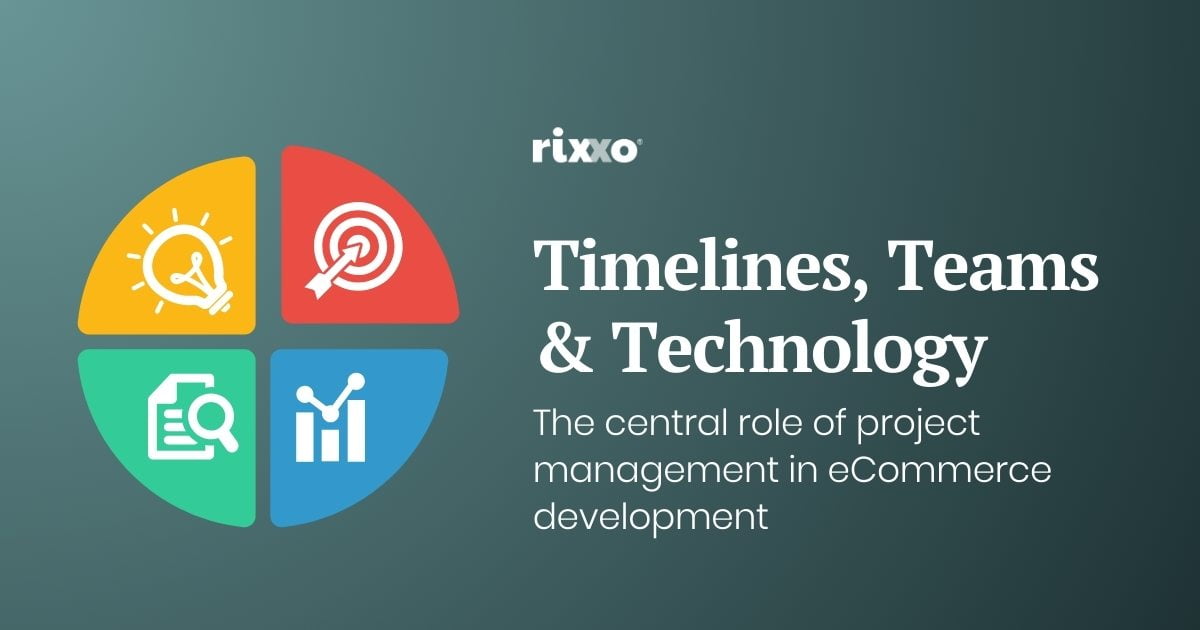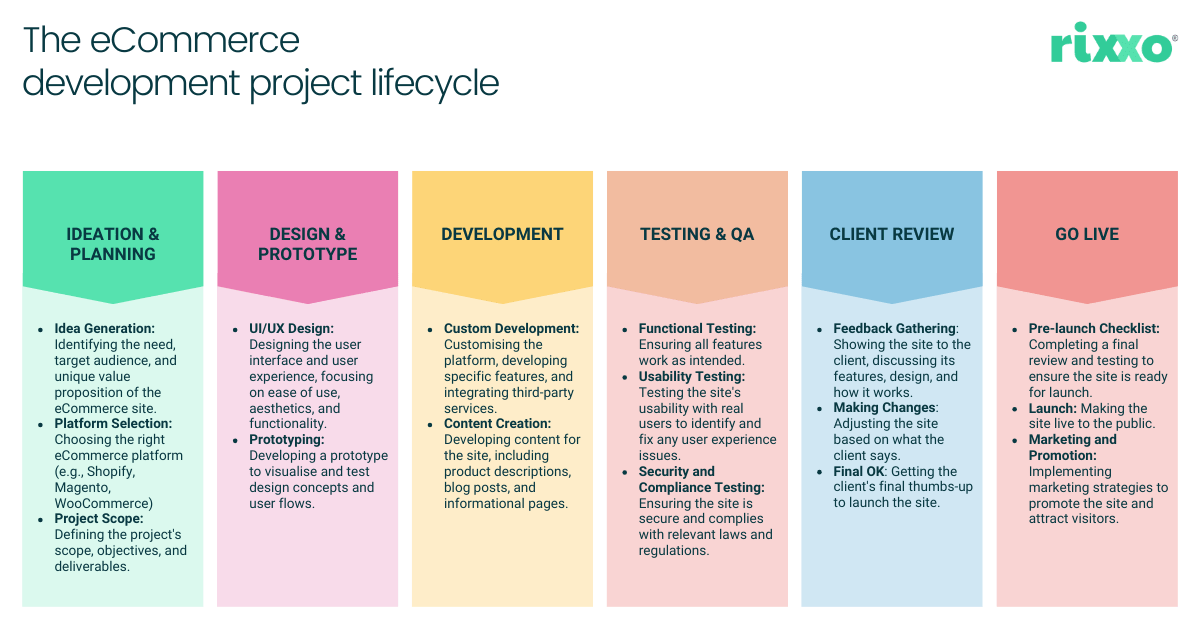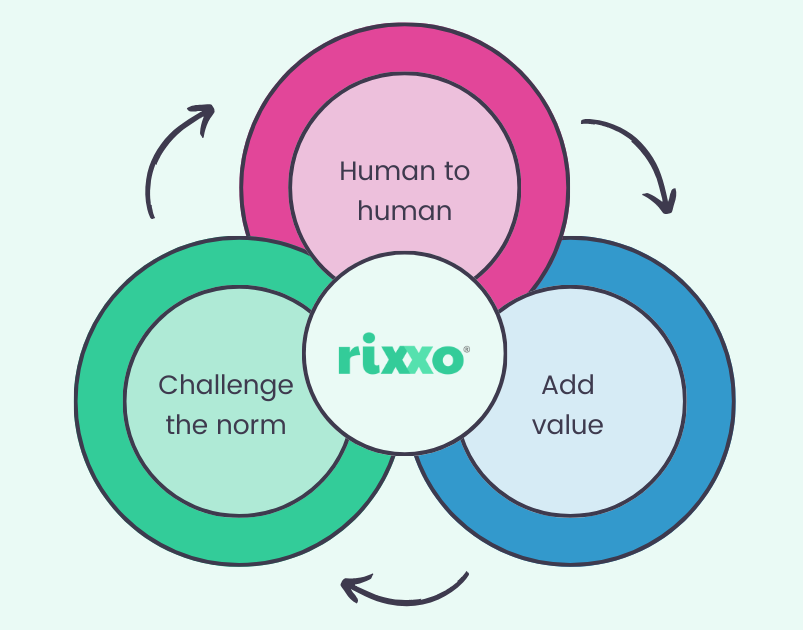Timelines, Teams, & Technology: The Central Role of Project Management in eCommerce Development

Even for us at Rixxo, with all our experience as an eCommerce agency, creating an eCommerce site feels like setting off on a grand adventure. It’s thrilling, absolutely, but it’s also packed with challenges and unknowns. Just like in any adventure, there are highs and lows. The excitement comes from crafting something new and potentially groundbreaking, where every decision could lead to success. However, it requires bravery and resilience, as the path is filled with complex decisions, technical hurdles, and the pressure to meet expectations.
It’s a journey that demands our best effort, creativity, and teamwork to navigate through the intricate process of bringing an online store to life.
In the beginning, there are lots of big strategic decisions to make, like picking the best platform and integrating other software. These choices are the building blocks for everything else. We know how crucial this part is, so at Rixxo, we call it Foundations™.
Foundations™ is our proven process of planning and research to make sure a project will succeed. We really get to know each business and spend extra time at the beginning to understand what the project needs. And project management is super important in this phase at Rixxo.
The project lifecycle of an eCommerce site
Once you get to the development stage, there are so many moving parts with competing priorities, that things can quickly spiral out of control. It’s a balancing act that demands both strategic foresight and impeccable organisation.


Good project management is essential for eCommerce development, ensuring the project’s success by guiding it from the initial concept to the final launch and beyond. It is the project manager who orchestrates the pace and direction of the project, and even though they might not have hands-on expertise in every area involved, they do have a comprehensive understanding of how each piece fits into the larger puzzle.
The project manager coordinates the efforts of diverse team members—designers, developers, content creators, and more—to work towards a common goal. They ensure that everyone is aligned with the project’s objectives, timelines are met, and resources are used efficiently.
A project manager navigates through challenges and changes that inevitably arise during the development process. They are adept at problem-solving and making critical decisions to keep the project moving forward. By maintaining clear communication with all stakeholders, the project manager keeps everyone informed of progress, adjusts for any setbacks, and manages expectations.
The project manager is also responsible for maintaining the project’s quality standards. They oversee the testing phase to ensure that the eCommerce site not only functions as intended but also delivers a user experience that meets or exceeds expectations. This attention to detail extends to the launch phase, where the project manager ensures a smooth transition to a live environment, ready to address any immediate issues that may arise.
Good project management is the backbone of a successful eCommerce build. It brings structure to the inherent chaos and complexity of development projects, enabling teams to deliver high-quality work within the constraints of time and budget. With a skilled project manager at the helm, an eCommerce project has a solid foundation for success, from the drawing board to the final launch.
Leadership and team dynamics
To keep everyone on the same page and stay motivated requires leadership skills that go beyond just good organisational skills. A project manager keeps everything running smoothly, not just by managing the plan but also by helping the team work better together.
Here’s how:
- Creates a team spirit: They make sure everyone is talking, sharing ideas, and working as a team. It’s all about getting people to collaborate and feel like they’re part of something bigger.
- Sets milestones: The project manager makes sure everyone knows what they’re working towards. Clear goals and milestones help everyone stay focused and understand how their work fits into the big picture.
- Leads by example: Good project managers show how it’s done. They’re dedicated, make smart decisions, and keep everyone moving in the right direction, even when things get tough.
- Solve problems: Whenever there’s a disagreement or problem, the project manager steps in to help sort it out. They listen, understand different viewpoints, and find a way to move forward.
- Adapts to changes: Projects can change, and the project manager is ready to shift gears when needed. They keep the team flexible and focused, even when plans change.
- Empowers the team: They trust the team to do their tasks and support them with whatever they need to succeed. This trust encourages everyone to take initiative and bring their best to the project.
- Celebrates successes: When the team hits a milestone or does something great, the project manager is the first to give a high-five. Celebrating these moments keeps everyone motivated.
- Encourages growth: They also look for ways to help team members grow and get better at what they do, whether through new challenges or learning opportunities.
In short, the project manager is a linchpin, making sure everyone works well together, stays motivated, and heads in the right direction.
Choosing the right project management methodology


When it comes to managing an eCommerce development project, picking the right approach can make all the difference. Let’s compare two main types: Agile methodologies, like Kanban and Scrum, versus traditional methodologies, such as the Waterfall model.
Agile vs. traditional methodologies
Agile Methodologies:
Agile is all about flexibility and adapting to change. It breaks the project into smaller bits, making it easier to manage and adjust as you go. This is great for eCommerce development because online markets and customer needs can change quickly.
- Kanban is a visual method using boards and cards to show what needs to be done, what’s in progress, and what’s completed. It helps teams see how work is flowing and makes it easier to spot and fix bottlenecks.
- Scrum divides work into short cycles called sprints, usually two to four weeks long. The team focuses on a specific set of tasks in each sprint, allowing for quick adjustments based on feedback or changes in the project.
Traditional Methodologies (e.g., Waterfall):
The Waterfall model is more rigid and linear. It follows a fixed sequence: you finish one phase (like planning or design) before moving on to the next (like development or testing). This can be a challenge in eCommerce development because if something needs to change, it often means going back to square one.
Comparison in eCommerce Development:
- Flexibility: Agile is better suited for projects where requirements might change, as it allows for more flexibility and rapid adjustments. This is often the case in eCommerce, where trends and customer preferences can shift quickly.
- Visibility and control: Agile methods like Kanban provide a clear visual representation of progress and bottlenecks, which can help teams stay on top of eCommerce development projects. Scrum’s regular check-ins (sprints) also offer frequent opportunities to assess and adjust the project’s direction.
- Risk management: Agile methodologies allow for early and frequent testing, which can help catch issues sooner. This can be particularly useful in eCommerce, where user experience is paramount, and issues need to be resolved quickly to avoid losing customers.
- Timeline and budget: Traditional methods like Waterfall might make it easier to set a strict timeline and budget from the start, but they offer less flexibility to adapt. Agile, while more adaptable, may require a more flexible approach to budgeting and timelines.
While traditional methodologies have their place in projects with clear, unchanging requirements, Agile methodologies often provide the flexibility, visibility, and adaptability needed for an eCommerce development project.
The role of technology in project management
Technology plays a huge role in modern project management, making everything from talking to team members to finishing tasks easier and more efficient than ever before. Here’s how technology is helping teams collaborate and project managers keep a birds eye view of things:
- Keeps everyone talking: Tools like Slack and Zoom make it super easy for teams to chat, share updates, and solve problems together, no matter where they are.
- Fosters collaboration: With Google Docs and similar tools, multiple people can work on the same document at the same time. This means no waiting around for someone else to finish before you can start your part.
- Task management: Apps like Asana and Trello let teams list all their tasks, who’s doing them, and when they need to be done. This helps everyone keep track of what’s happening and makes sure nothing gets missed.
- Automation for repetitive tasks: Many project management tools can do repetitive tasks automatically, like sending reminders about deadlines. This saves time and means fewer mistakes.
- Shows you the big picture: Technology can show real-time data on how the project is going, like if it’s on schedule and under budget. This helps managers make smart decisions to keep everything running smoothly.
- Manages Resources Smartly: Technology helps make sure that the project’s time, money, and people are used in the best way possible, ensuring the project finishes without wasting resources.
In short, technology can empower the project manager by helping teams communicate, work together, stay organised, and make smart decisions, all of which are key to making a project successful.
Risk management
Building an eCommerce store is exciting, with the potential to draw millions of customers and boost your business. However, it involves risks. Without proper risk management, these could seriously hinder the project. Risk management is crucial in eCommerce project management to identify, understand, and tackle these risks, ensuring the project is protected from surprises.
Three of the most common risks encountered in eCommerce projects are budget overruns, scope creep, and technology challenges:
- Budget overruns: Financial resources are the lifeblood of any project. Misestimating costs or failing to anticipate unforeseen expenses can lead to budget overruns, straining resources and potentially compromising project quality or completion.
- Scope Creep: This occurs when the project’s requirements start to expand beyond the initial scope without corresponding adjustments in time, resources, or budget. It’s a gradual process that can sneak up on a project, leading to delays, increased costs, and diluted focus.
- Technology Challenges: The fast-paced evolution of technology means that eCommerce projects must navigate a landscape that can change mid-project. Choosing the wrong platform, underestimating the complexity of integrations, or encountering unexpected technical limitations can derail development timelines and inflate costs.
Recognising and managing these risks is an important part of project management in eCommerce development. It involves a systematic approach to planning, executing, and monitoring project activities, ensuring that risks are controlled and the project remains on track. By understanding and mitigating these risks, project managers can steer their eCommerce development projects to successful completion, delivering on time, within budget, and according to the desired quality standards.
A human-first approach to project management


Managing projects is more than simply sticking to schedules and ticking off tasks. It’s also about understanding and connecting with the team behind the work. This approach, where we put people first, is what we mean by “human to human” at Rixxo and why it’s one of our core values as an eCommerce agency.
Adopting a human-centric approach means creating an environment where everyone feels supported and appreciated. This not only makes the team happier but also more productive. It helps everyone tackle the ups and downs of creating an eCommerce site together, making the process smoother and more enjoyable for everyone involved.
Project managers stand between the team and outside pressures like client demands, keeping the team focused and undisturbed. They ensure the team stays on track by shielding them from external distractions and managing client expectations, allowing the team to concentrate on their work.
Accountability, ownership & communication
Project managers take the lead on both the highs and lows of a project. They’re the ones saying “we’ve got this” when things go well, and “we’ll fix this” when they don’t. This attitude helps the team keep moving forward, knowing there’s a steady hand guiding the ship, ready to tackle any challenge head-on.
A big part of a project manager’s job is keeping clients in the loop. They share the good, the bad, and the in-between openly, ensuring clients understand what’s happening at every stage. This honesty builds trust and makes clients feel more connected to the project, smoothing out bumps along the way.
Project managers walk a fine line. They shield the team from external stress but also make sure everyone knows their work matters. By holding the team accountable for their tasks, project managers foster a sense of ownership and pride. It’s about creating a team that’s invested in their work and proud of what they achieve together.
The impact of the human-to-human approach: key benefits
Enhanced team performance
The human approach boosts team spirit, productivity, and innovation. When team members feel understood and valued, they’re more motivated to give their best. This positive atmosphere leads to creative solutions and high-quality work, as everyone is encouraged to share their ideas and contribute their unique strengths.
Strengthened client relationships
Good communication and taking responsibility for the project’s ups and downs build stronger ties with clients. By being open and honest, project managers create a foundation of trust. Clients appreciate being kept in the loop and are more understanding when challenges arise, leading to a more collaborative and respectful partnership.
Long-term success
Adopting a human approach lays the groundwork for lasting achievement. Projects are more likely to succeed because the team is motivated and clients are supportive. This positive environment nurtures a resilient and united team, ready to face whatever comes next. Over time, this leads to a strong, cohesive group that can take on new challenges with confidence, ensuring the long-term success of both the team and the projects they undertake.
Here at Rixxo, we’ve seen the power of the human-to-human approach to eCommerce project management. Project managers play a key role in protecting their teams, keeping them focused, and ensuring a supportive workspace where creativity thrives.
This approach doesn’t just boost team morale and productivity; it also strengthens client relationships through honest and clear communication. It’s crucial for navigating projects smoothly and building trust.
The benefits are clear: better team performance, stronger client bonds, and a foundation for long-term success. Embracing the human approach is more than good practice; it’s essential for achieving project goals and driving business forward. It ensures teams are cohesive and projects are successful, paving the way for future growth and resilience.
In conclusion
This article dives into the critical role of project management in creating eCommerce sites. It’s a journey from start to finish, where making smart choices early on sets the stage for everything that follows. Here’s what we learned:
- Project managers are linchpins: They keep the team on track, make sure everyone’s working together towards the same goal, and ensure the final site meets high standards.
- Leadership matters: Good leadership isn’t just about organising tasks; it’s about inspiring the team, setting clear goals, and celebrating successes together.
- Choosing the right approach: Whether it’s Agile or traditional methods like Waterfall, picking the right project management style can make a big difference in handling changes and staying flexible.
- Tech tools help: Technology makes it easier for teams to communicate, stay organised, and keep the project moving smoothly.
- Risks need managing: Every project has its risks, like budget issues or tech challenges, but good project management can spot and fix these problems early.
- People first: The human approach puts the team and client relationships at the heart of the project. It’s all about trust, communication, and supporting each other.
In short, project management is crucial for the success of eCommerce sites. It’s not just about managing tasks; it’s about leading teams, choosing the right methods, using technology smartly, managing risks, and putting people first. This approach doesn’t just get projects across the finish line; it sets them up for long-term success and growth.
